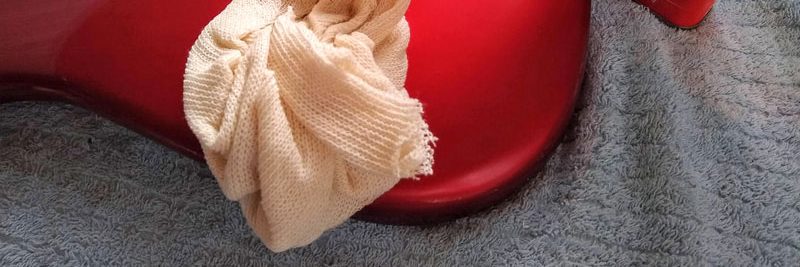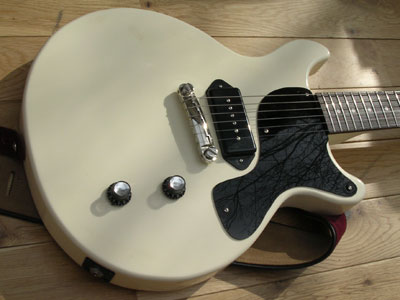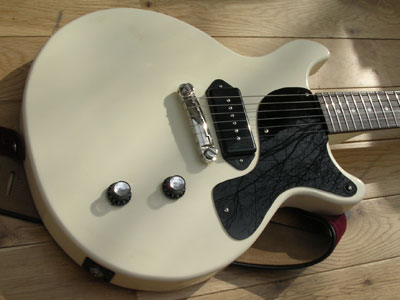
Vintage White Les Paul Junior

I built this Les Paul Junior copy from scratch and finished in in Vintage White nitrocellulose lacquer.
The body is one piece of mahogany, with a maple neck.



I built this Les Paul Junior copy from scratch and finished in in Vintage White nitrocellulose lacquer.
The body is one piece of mahogany, with a maple neck.

Hi there , lm in Scotland and interested in trying to find a decent body and neck kit to finish??. Looking to build a gibson les paul junior , right hand single horn, with a tune-o-matic bridge like the 1986 model single pickup. Do you supply this type of thing at all or maybe you could point me in the right direction??. Thanks your guitars look amazing.
Kind regards, David
Not something I could supply sorry but try Graham here
Hi Steve.
Would you say the picture was a fairly true representation of the the colour. I’m looking for something inbetween Olympic white and the darker vintage whites that seem to be yellow looking. This looks more buttermilk in colour which is what I’m after.
Yes it’s a pale cream colour and should be what you need
Hi Steve,
I have a sapele LP junior body that I am about to finish. This is the exact finish I want for mine. What paints and processes do I need to achieve this finish?
Hi Nathan. Sorry for the delay replying, but the comment went in to spam so I didn’t see it.
It’s my Vintage White paint – you can see the gist of the process here: https://www.manchesterguitartech.co.uk/2016/02/07/reverse-headstock-stratocaster/ but sapele will also need grain filling before sealing, see: https://www.manchesterguitartech.co.uk/2011/05/02/grain-filling-an-ash-telecaster-body/
For just a body you’ll need:
Any questions, it’s best to email!
Any info on installing ferrules for wrap around bridge post
Drill the holes the right size – they only need to be slightly smaller than the diameter of your anchors. You can tap the anchors in, or use a press. I tend to tap them in, using an old post screwed into the anchor, and a plastic-faced hammer. It’s a good idea to do a test run on scrap wood to check the fit.
Oh and importantly, don’t forget to install your bridge earth wire before you insert the treble side anchor!
Hi Steve
Nearly finished on a Junior (using your paints) and am ready to fit the bridge. For earthing should the earth wire be in contact with the post, anchor or the underside of the wrapover bridge itself? I’ve never seen this pictured, or even discussed on the web. Also, should the larger bit of the anchors be flush with the top surface of the guitar, or stand proud of it?
Any advice would be much appreciated.
regards, Jon
Hi Jon, the earth wire should pass through a hole from the control cavity to the hole for the anchor and the anchor pushed in so that the wire is held in contact with its side. That’s all you need.
If you have yet to drill the hole for the earth wire, it’s probably best to go from anchor to control cavity where there is a larger margin for error.
Gibson (and pattern) anchors don’t have a collar and so can be driven in flush, or even just below the surface of the wood. If you are using “metric” anchors with a collar, the collar can either sit on top of the finish or you can machine a small recess to accept it. Having the collar over the finish means you can’t get the bridge as low (this may not be an issue) but cutting the recesses at this stage risks damaging your paintwork.
Many thanks Steve!